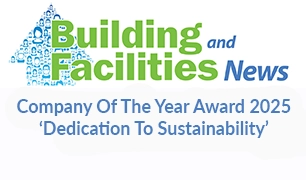The importance of launching a sustainable strategy for commercial buildings has never been more important. According to data from the EU’s climate service reported by the BBC today, global warming has, for the first time, exceeded 1.5C across an entire year. This temperature limit, promised by world leaders in 2015, has been seen as crucial to help avoid the most damaging impacts of global warming. A 2018 UN report said that the risks from climate change – such as intense heatwaves, rising sea levels and loss of wildlife – were much higher at 2C of warming than at 1.5C.
Limiting long-term warming to 1.5C above “pre-industrial” levels has been a key symbol of international efforts to tackle climate change, and whilst the report notes that this first year-long breach doesn’t break that landmark Paris Agreement, it does bring the world closer to doing so in the long-term.
All the major datasets agree on the recent warming trajectory and that the world is in by far its warmest period since modern records began – and likely for much longer. Berkeley Earth reported that the calendar year 2023 was more than 1.5C above pre-industrial levels. Other science bodies, such as NASA, put the past 12 months slightly below 1.5C of warming. Fluctuations in reporting are expected, but at the current rate of emissions, the Paris goal of limiting warming to 1.5C as a long-term average – rather than a single year – could be crossed within the next decade.
This new data sends out yet another clarion call to the commercial sector, where sustainability has become a defining theme for modern businesses increasingly seeking ways to reduce their environmental impact. While numerous avenues exist, prioritising water heating in a commercial sustainability strategy offers unique advantages, making it the optimal starting point for many organisations.
So why is addressing water heating in commercial buildings so significant? And how can it serve as a springboard for launching a sustainable strategy to more broadly support commercial organisations?
Water heating often accounts for a significant portion of a building’s energy consumption, ranging from 15-40% depending on the industry and usage patterns. This makes hot water both familiar and more often than not business critical, so reducing hot water demand and implementing efficient heating methods translates to substantial energy savings and emission reductions that have recognisable advantages to its users across the built estate.
Diverse solutions, from upgrading equipment, especially gas-fired to more efficient gas or grid-electric, and utilising renewables such as solar thermal and air source heat pumps can be tailored to various building sizes, budgets, and hot water demands. This scalability makes hot water systems a readily addressable target for sustainability initiatives, with easily quantifiable impact that can be demonstrated to stakeholders. Critically, many water heating efficiency measures offer attractive payback periods, this is especially true of solar thermal where up to 30% offsetting of annual energy demands means initial investment is often quickly recovered. This economic attractiveness makes it a compelling entry point for sustainability efforts.
Addressing water heating can also have wider positive impacts on a business. One area which has seen far greater focus since the COVID-19 outbreak has been improved Indoor Air Quality (IAQ). Certain water heating solutions, especially air source heat pumps, eliminate the need for combustion processes, potentially reducing harmful emissions and improving indoor air quality for occupants.
By demonstrating commitment to sustainability through water heating upgrades, companies not only meet regulatory compliance helping to avoid potential fines or penalties, but can demonstrate active corporate social responsibility which resonates positively with customers, employees, and investors, boosting brand image and reputation. This function of a business is increasingly being recognised, with notable examples of organisations across the leisure and catering markets in particular, embracing a sustainable approach to enhance engagement with customers and define services from competitors. This also resonates with employees, meaning that an initial focus on water heating, which is both familiar and also often business critical can be a starting point for engaging employees in broader sustainability initiatives, fostering a culture of environmental awareness and responsibility.
So where do you begin? The most valuable, yet possibly single lowest cost, activity you can start with is to conduct an energy audit to assess your buildings’ hot water consumption patterns and identify key areas for improvement. Adveco provides a comprehensive service that incorporates live metering of your system and creates an accurate, cost-effective system design that can deliver carbon reductions and meet all your business hot water demands. This provides the data you need to evaluate any upgrade and a benchmark against which to explore various alternatives such as high-efficiency gas or electric boilers, heat pumps, and solar thermal systems, which can be deployed in isolation or as hybrid systems. It also enables consideration of other factors like budget, space constraints, and fuel availability, which all factor into launching a sustainable strategy for a building. Working with Adveco at this early stage gives you access to expert guidance from qualified professionals who can provide necessary consultation to determine the most suitable approach for your building’s specific needs, and provide a working design that can help secure funding from within the organisation, or externally via government grants, financial incentives, or green loans to offset the initial investment costs of your chosen system design.
With a live metered dataset, you also gain insight into prospective carbon reductions and operational costs of the new system. These can be tracked and monitored against, to demonstrate real-world savings in energy consumption and emission reductions, which can be applied toward regulatory compliance as well as used to celebrate achievements by sharing sustainability efforts with stakeholders through transparent communication.
Water Heating as a Stepping Stone to Comprehensive Sustainability
While water heating serves as a powerful launchpad, achieving true sustainability requires a holistic approach. Once successful water heating initiatives are implemented, businesses can leverage this momentum to expand their sustainability efforts by investing in wider energy efficiency across other building systems such as lighting, ventilation and especially space heating, all of which can require greater levels of physical alteration, operational disruption and accompanying costs. Also, greater attention should be given to further integration of renewable energy, exploring options for on-site renewable energy generation such as installing solar PV panels alongside the higher efficiency solar thermal collectors used in water heating. PV enables the generation of electricity that can be deployed to a range of building systems. Since PV requires greater roof space than solar thermal, clear decision-making is required when available space for solar collection is limited, with solar thermal recommended to be prioritised as the more effective means of delivering water heating for a small footprint.
Whichever route is decided upon, organisations should choose environmentally responsible suppliers and prioritise products with low environmental footprints as part of the procurement process. Increasingly building consultants will factor this into a project design, calculating the embodied carbon of any new system, whether water heating, space heating, ventilation and so forth. It’s an important consideration when launching a sustainable strategy, ensuring that a project meets, or preferably exceeds current building regulations ensures projects are not held up or shelved, which will be costly to both the business and the environment.
Focusing on water heating presents a strategic and impactful starting point for commercial buildings embarking on their sustainability journey. By addressing this often-overlooked area, businesses can achieve significant energy savings, emission reductions, and tangible business benefits. Furthermore, this initial success creates a springboard for wider sustainability initiatives, ultimately contributing to a more responsible and environmentally conscious future. Remember, sustainability is a continuous journey, and by starting with water heating, businesses can unlock a pathway towards a greener and more sustainable future.
















